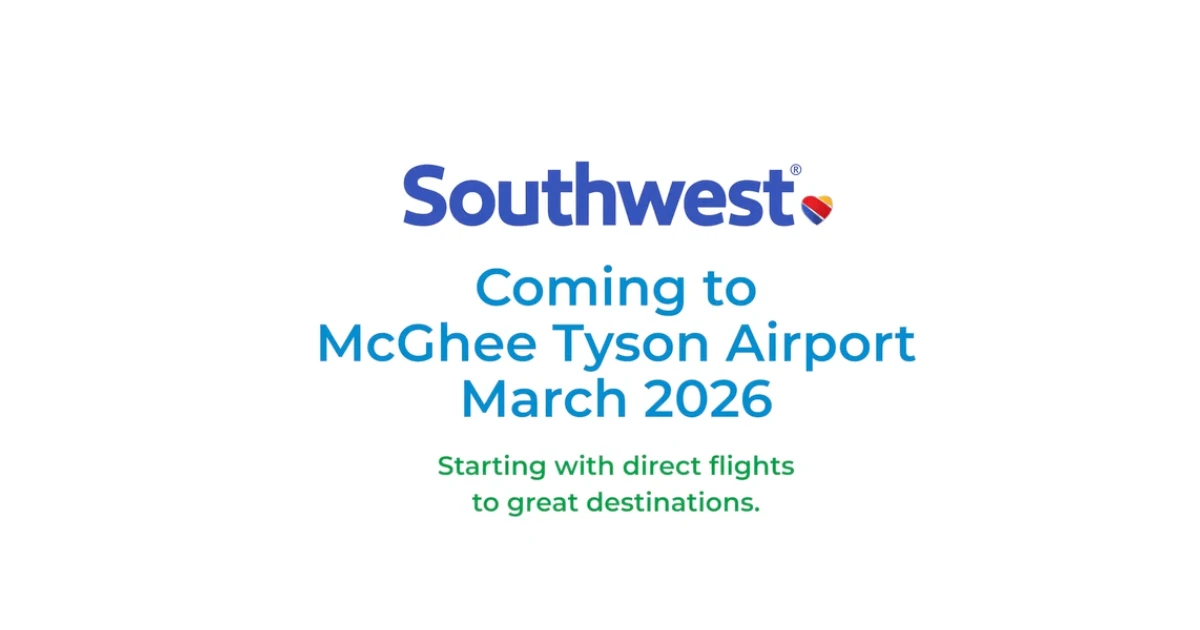Pack your bags, Knoxville! McGhee Tyson Airport has announced today that it will begin offering flights with Southwest Airlines next year.
Officials stated that these flights will be offered starting in March 2026, and the airline will provide service to four destinations.
According to the announcement video posted to social media, the first four destinations they will be offering will include Nashville, Dallas, Baltimore and Orlando. This marks one of the most significant expansions at the airport.
In other aviation news, discount airline Spirit Airlines could completely collapse before 2026. If Spirit were to scale back or cease operations, it could have notable effects on Tennessee airports, where the airline has targeted price-conscious leisure travelers. In Chattanooga (CHA), Spirit’s entry had increased competition on select routes and put downward pressure on fares; its absence could allow remaining carriers to raise prices or reduce capacity. For a smaller market like Chattanooga, the loss of a ULCC option could also reduce inbound tourism from budget travelers.
In Memphis (MEM) and Nashville (BNA), Spirit’s departure could lead to similar fare increases, particularly on high-demand leisure routes to Florida and Las Vegas where it has historically competed aggressively. If Spirit is unable to secure financing and restructure its operations, industry observers warn it may not survive into 2026. A collapse could reduce competition in the budget travel segment, potentially benefiting rivals such as Frontier, Breeze, JetBlue, United, and Sun Country.
While larger airports like BNA may be able to fill capacity gaps more quickly with other low-cost carriers, Spirit’s exit could still reduce scheduling flexibility for travelers and narrow fare choices, especially during peak travel periods. Spirit issued a stark “going concern” warning in its latest Securities and Exchange Commission filing, saying there is “substantial doubt” about its ability to continue operating over the next year. The disclosure, made in the company’s second-quarter 10-Q, cites a risk of breaching minimum liquidity covenants, failure to meet requirements under its credit card processing agreement, and the expectation of having to provide additional collateral in 2026 to secure a renewal of that agreement.
Spirit’s leadership team said its current turnaround efforts—including asset sales, fixed cost reductions, a Premium Economy product launch, and pilot furloughs—are not enough to stabilize the company. Spirit is now exploring further measures such as selling aircraft, real estate, and airport gates while trying to raise new capital. The carrier warned that without additional action, it could violate debt agreements and be unable to meet payment obligations.
The warning comes just months after Spirit emerged from bankruptcy in March 2025, only to post even weaker results. For the second quarter, the airline’s total revenue per available seat mile (TRASM) rose 4.8% year-over-year, and revenue per passenger segment increased 7% to $116.05. However, capacity plunged 23.9% on 22% fewer departures, while aircraft utilization fell 26.4% to 7.8 hours per day. Unit costs excluding fuel jumped 19.2%, with higher spending across salaries, benefits, aircraft rent, landing fees, and other expenses.
The carrier ended the quarter with an operating margin of -18.1% and a net margin of -24.1%, both worse than the same period last year. Cash reserves fell to just over $407 million after burning through nearly $250 million in the quarter. Spirit currently operates 215 aircraft, slightly more than the 210 it had a year earlier, but has reduced off-peak flying to cut losses.
Spirit’s troubles reflect a broader shift in U.S. air travel demand. Once a model for the ultra low-cost carrier (ULCC) strategy—with industry-leading margins and low fares that expanded access to air travel—the airline has struggled since the pandemic, as more passengers sought premium amenities it was not positioned to offer. Rising labor costs, loss of cost advantages, and a tarnished brand have compounded the challenges.
The airline’s attempt to merge with JetBlue was blocked by the Biden administration, and a later proposal from Frontier Airlines was rejected. Analysts say rejecting those deals may have removed a potential lifeline.















